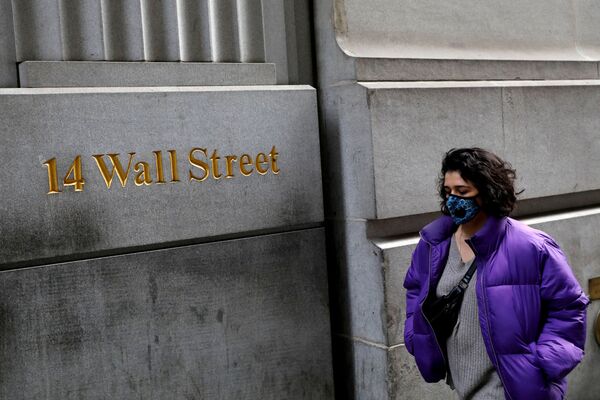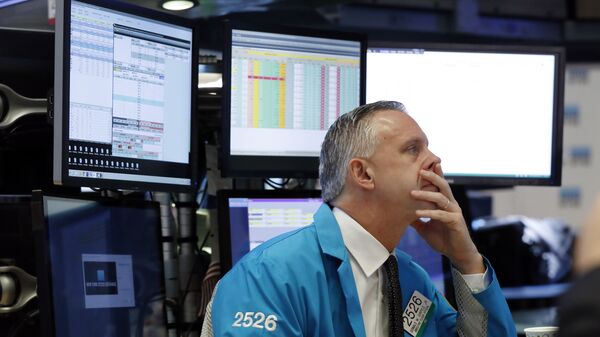European markets and US futures continued their free fall on Tuesday despite bouncing back at the opening, as the global economy is bracing for recession amid the coronavirus outbreak.
#5Things
— Bloomberg Markets (@markets) March 17, 2020
-Fiscal fightback begins
-Markets unimpressed
-Economists gloomy
-Airlines struggle
-Data duehttps://t.co/J0Y9dL5dfT pic.twitter.com/OOfr03Rfd9
The world's governments and central banks are taking unprecedented measures to tackle the economic consequences of the Covid-19 spread: while the European Central Bank (ECB) is expanding stimulus measures, the Bank of England, Bank of Canada and the US Federal Reserve dramatically slashed interest rates last week. However, these efforts have so far failed to help markets to recover.
Citing four former chief economists at the International Monetary Fund, the Financial Times has signalled that a global recession – which is characterised by the world's economic growth falling below 2.5% - is already here.
NEW: Four former top IMF economists say we are already in a global recession https://t.co/CCvMDzDlzU pic.twitter.com/aZ0rtPGzuq
— Matthew Garrahan (@MattGarrahan) March 15, 2020
Short-Term Prognosis for Global Markets is Bleak
Christopher Bovis, professor of International Business Law at the University of Hull, does not rule out that the Federal Reserve and global central banks will continue to reduce interest rates in case the markets continue to react negatively to the pandemic. He explains that the financial institutions have intervened in order to ensure liquidity in the markets.
"If the interest rates policy does not reveal positive effects in the medium term, the Federal Reserve will have to come up with a different suite of policies varying from quantitative easing to direct subsidies", he elaborates. "The later policy is being considered at European Union level, where the European Central Bank is close in announcing direct intervention to the markets through Quantitative Easing measures".
Bovis notes that though the short-term prognosis for global markets is bleak "as sentiment and panic cover up any rationale in strategic decisions" he expects a significant adjustment in equity markets in the future.
"They have trending close to being overpriced for many years, and such a downward movement might provide impetus for debt markets to ensure infrastructure and related activities across the world create growth opportunities", the professor elaborates.
Morgan Stanley Says Markets Are Bottoming So Sell U.S. Dollar pic.twitter.com/LHLnVo0Zbo
— Investingport (@investingport) March 16, 2020
While Morgan Stanley strategists are recommending investors to sell the US dollar amid the global financial market slump, Bovis deems that the US Dollar "will play a role in addressing the economic effects of the pandemic" remaining a strong reserve currency along with the euro.
Fed, ECB's Measures Ineffective for a 'Supply Shock'
Daniel Lacalle, chief economist at Tressis Gestion and author of the book "Escape from the Central Bank Trap" deems that the major reason behind the market's sell off is that the general response from the Federal Reserve, the Central Bank of Europe and governments has proven to be "ineffective for a supply shock".
"What you have right now is not a demand issue, definitely not a liquidity or credit demand issue", Lacalle says. "What you have is a supply shock and a shut-down of many economies because of the epidemic, therefore adding liquidity and cutting rates makes nothing, does nothing. It’s ridiculous. So I think the reason why investors are selling so quickly is because that - instead of seeing it as a sign of strength from central banks (they see it) as a sign of weakness".
According to the economist, one needs to understand that "where we come from is from a very aggressive and very, very bullish market, market was highest in January". So, the real problem now is not a lack of faith but an inadequate response from the global financial institutions, he believes.
"What governments should do is to take supply measures", Lacalle insists. "So it's very important that governments start to cut taxes for small and medium enterprises, provide working capital lines for companies that are suffering because of the shutdown".

Indebtedness is Dragging the Economy Down
As the Dow plummeted nearly 3,000 points on Monday, President Donald Trump admitted that the country "may be" heading to a protracted economic slowdown amid the coronavirus outbreak. Meanwhile, the UCLA Anderson School of Management revised its relatively optimistic prognoses and acknowledged that the US economy has already halted its growth and will remain in recession through the end of September 2020.
"We're already in a deep recession in the US and most countries as well", says Dr Jack Rasmus, professor of economics and politics at St. Mary’s College in California.
According to Rasmus, the indebtedness is remaining the biggest problem that is not allowing the economy to recover.
"You see a problem in the US and a lot of other places is that businesses, nonfinancial businesses have run up huge amounts of debt, corporate debt, particularly in certain industries like the fracking industry", he says. "In retail, what's called the junk debt, high interest paying debt. And they got to keep paying on that debt and they're not going to have an income flow to do it".
The professor explains that the massive injection of new liquidity in the markets through cutting interest rates and quantitative easing by the Federal Reserve "is not going to do anything for the fact that businesses are shutting down and people don't have work" amid an "unprecedented financial crisis".
Rasmus presumes that what is happening now is in some sense a repeat of the 2008 global financial crisis. Now the Federal Reserve and central banks have to cope with the same structural economic problems which were simply "patched" in 2008-2009 by creating even more debt that has snowballed over the past decade.
When it comes to the future of the US economy, a lot of depends on what the Trump administration does over the next 30 days, the professor says: "If they don't have some rules, suspending mortgages and suspending rent and other big ticket costs and provide some unemployment insurance for the rest of their people's normal living expenses, there's going to be a big problem in about 30 days", he predicts.
'The US is Unlikely to Default on That Step'
Wall Street analyst and investor Charles Ortel agrees that the difference between the 2008 financial crisis and what is unfolding now "is that there’s a lot more debt on the system - not just in the US, but around the world".
"So this approach to trying to lower interest rates and promising fiscal stimulus to the governments is the approach that I would argue did not work in 2007-2009", Ortel adds. "It’s not in the line of the structural problems. So they announced this measures and markets lay down today. I think they were unwise in 2007-2008 and they are unwise now. We have fewer tools in the toolbox".
Having said this, the investor highlights that if compared with the markets around the globe, the US market is by far the most attractive one: "It is vast as in a consumption market, the level of investment activity is gigantic", he stresses.
"American consumers consume $14 trillion a year roughly. And the Chinese - they’ve spent $5 trillion or so", Ortel elaborates. "And there are four times as many Chinese people as there are Americans. In addition, the level of investment activity has been also very large. Do we have a problem - yes - we have too much debt. But as people look around the world and look where want to put capital - the US appears to be the favour place, at most".
Therefore, according to the Wall Street analyst, the US will endure the crisis and won't default.




